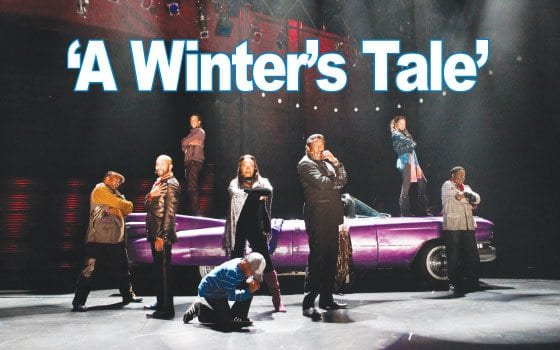
A purple Cadillac convertible rolls onto a cavernous, blackened stage in the opening scene of “Best of Both Worlds,” an RandB and gospel retelling of Shakespeare’s “The Winter’s Tale.” The Cadillac’s cargo—a troupe of actors—tumbles out and takes possession of the audience all the way through to the show’s rousing finale.
On view through Jan. 3 at Loeb Drama Center in Cambridge, the American Repertory Theater (ART) production is, as Cleavant Derricks, the narrator, tells the audience, a mix of “some Shakespeare with some soul—the best of both worlds.”
Some scenes deliver his promise to the full, and with a cast of heavy hitters, flawless musicians, and alluring stagecraft, the production is never less than fun.
Director Diane Paulus, in her first season as ART artistic director, is no stranger to fusing high brow and low, from acclaimed classical opera productions to her Tony Award-winning Broadway revival of “Hair.” The book and lyrics are by Randy Weiner, her spouse and frequent collaborator.
Multiple Obie winner and pioneering jazz cellist Diedre L. Murray composed the music, which is directed by Michael Mitchell. Providing live accompaniment to songs as well as atmospheric acoustic instrumentation throughout the production is a fine ensemble comprising Yoron Israel on drums, guitarists James Peterson and Fred Woodard, bassist Wesley Wirth, and keyboardist Michael Mitchell.
Complementing the tight and infectious musical direction is the visual harmony of a simple and striking stage set designed by Riccardo Hernandez; and costumes by Emilio Sosa that vary from hoodies and candy-colored wigs to royal robes that shine in the dark—all set off with the agile lighting by Aaron Black.
But most of the wattage comes from the nine actors.
Unfolding in two acts, the story is faithful to the heart of Shakespeare’s play. Without being a villain, a deeply flawed character destroys nearly all that is dearest to him. Poisoned with jealousy, a king loses his faithful wife, best friend, young son, and infant daughter—calamities followed by near-miraculous redemption and reconciliation, with a good measure of song, dance, and comedy along the way.
Ezekiel, the jealous king, is the handsome and charismatic baritone Gregg Baker, whose operatic and Broadway roles include Crown in “Porgy and Bess’’at the Metropolitan Opera. He has little to do but glower after accusing his wife, Serena (Jeannette Bayardelle) of a liaison with Maurice, his best friend and fellow king, played by Darius De Haas.
When their roles give the actors expressive latitude, they seize it.
A luscious Serena who originated the role in the production’s 2004 Off-Broadway run, Bayardelle exudes vulnerability and power as she sings a torrential solo entreating Ezekiel to trust her innocence.
Mary Bond Davis (Motormouth Maybelle in “Hairspray” on Broadway) plays Violetta, the mother of Ezekiel,. She tries to intercede on behalf of the
wronged queen. When Ezekiel imprisons his wife, Violetta ministers to her and her newborn baby girl.
Eight-year old Hingham native Sebastien Lucien is Mamillius, the son of the royal couple. He is a marvel from the moment he springs from the Cadillac and leaps into a series of break-dancing moves to his full-voiced lament, as he sings lyrics by Weiner in the plain and natural language of a child longing for his absent mother.
Nikkieli Demone is the couple’s steadfast friend Camillo. He also plays the Bear—a streetwise tough in a furry parka. As the tough, he crosses paths with Ezekiel’s factotum, 8-Ball (Lawrence Stallings) in a fateful, funny encounter.
Derricks’ narrator opens Act II by announcing the passage of 16 years and the change of scene from Ezekiel’s kingdom to the land of Maurice.
Borrowing a technique from Shakespeare, the first scene is a kind of show within a show. Sweet Daddy (the ever-ebullient Derricks) happily presides over a red-light district business with his two “Daughters of Joy” (Davis and Bayardelle). Also on hand are Rain, performed by Brianna Horne, whom he found as an abandoned infant and raised as his daughter, and her suitor, Tariq, played by Lawrence Stallings. He approves of the young man, unaware that he is actually a prince, the son of Maurice.
Regarding Rain as a hooker, Maurice (De Haas) commands his son to end what he considers a low-life dalliance. Singing a charged duet with Stallings, De Haas masterfully expresses his anger by drawing out some words in extended, flat notes that evoke a saxophone solo.
Reconciliation and redemption eventually prevail as the young lovers and their elders come together back in Ezekiel’s kingdom. Accompanying the actors in the exuberant finale are guest singers from a variety of Greater Boston gospel choirs. On Friday evening, Dorchester’s Kingdom Sanctuary Choir made a stately entrance onto the stage, raising hopes for a high-octane gospel performance. But despite the visual pizzazz, the guest choir is given a muted role, backing the cast in a pop-inflected closing number. A bit more gospel power at the close would deliver “the best of both worlds.”







